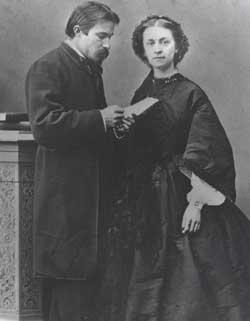
Elinor Mead and William Dean Howells
I recently finished reading William Dean Howells’s 1889 novel A Hazard of New Fortunes. Or rather, I finished reading and listening to it, as I had been partly reading it and partly pacing along with it via the public domain audiobook version available at LibriVox.org.
LibriVox is a younger cousin of such public domain stalwarts as the Internet Archive and Project Gutenberg, which were founded in 1996 and 1971, respectively. LibriVox, which started in 2005, is closer in age to Wikipedia, and it shares with all of these sites a highly decentralized, voluntaristic spirit and method. You can stream or download LibriVox’s audiobooks or you can become a reader, choosing any public domain text you fancy.
The most active volunteer readers on LibriVox tend to specialize, and some of them are exceptionally good, both in their performance and in their recordings, which are frequently as clear if not as slick as a well-produced podcast. Mil Nicholson, for instance, is a marvelous reader of Dickens; I listened to her Bleak House earlier this year, and her talent with the many different accents and characterizations was extraordinary.
Nicholas Clifford is the site’s most devoted reader of the work of both Henry James and William Dean Howells, although he has also dabbled in Henry Adams, Edith Wharton, Benjamin Disraeli, and Anthony Trollope. It was his recording of A Hazard of New Fortunes that I enjoyed so much. Clifford is a retired academic; a historian of modern China, he taught at Middlebury for many years and was provost there for eight (according to information here). Clifford is perfect at delivering a droll line smoothly; his readings are graceful and relaxed, but never languid. He has chosen his material well, in other words: rather than pitching his voice all over the place to craft sharply distinct characters, he is excellent at creating and maintaining an overall authorial voice which even in giving words to a character stands just to the side, neither immersed in their consciousness nor hovering omnisciently above the action. It is an ideal tone to strike for Howells and for James–the early James, certainly. (I am hesitant to try one of James’s later novels on audiobook; surely such syntactic complexity must be confronted on the page, I would think. Or perhaps it is better to absorb it as an auditor? I don’t know.)
I was also invigorated by the novel itself. What a masterful concatenation of the Gilded Age’s many contradictions, its pressing questions, its energy, and its opportunism! To me, it ought to be considered the Gilded Age novel. I should have read it in grad school–it is worth treble its weight in monographs. Howells himself has often been overshadowed by his two great friends, Twain and James, but he features as one of the recurring characters in Richard White’s The Republic for Which It Stands (about which I wrote a bit last week). Having previously read–and not wholly cared for–Howells’s Rise of Silas Lapham, Howells never stood out particularly to me, but I’m very glad now that White’s book prompted me to take a second look.
Hopefully my post can do the same–and introduce some new folks to LibriVox!

0